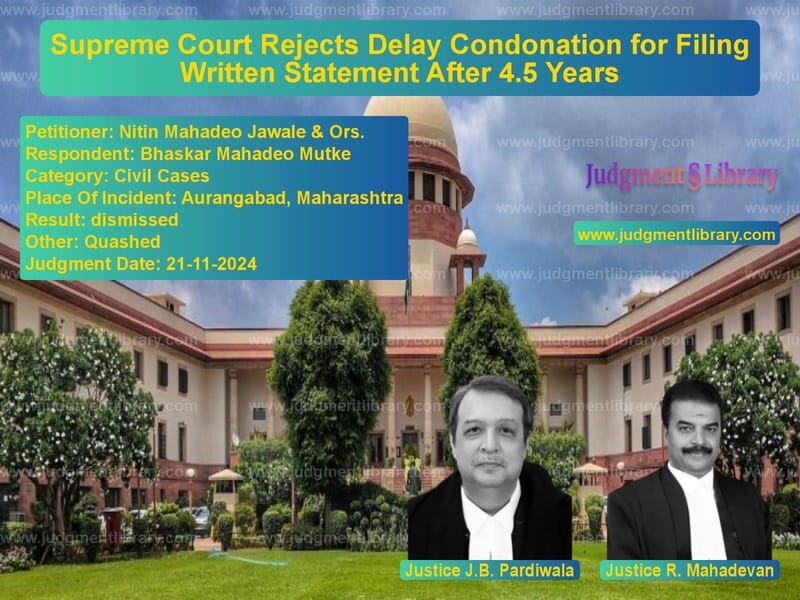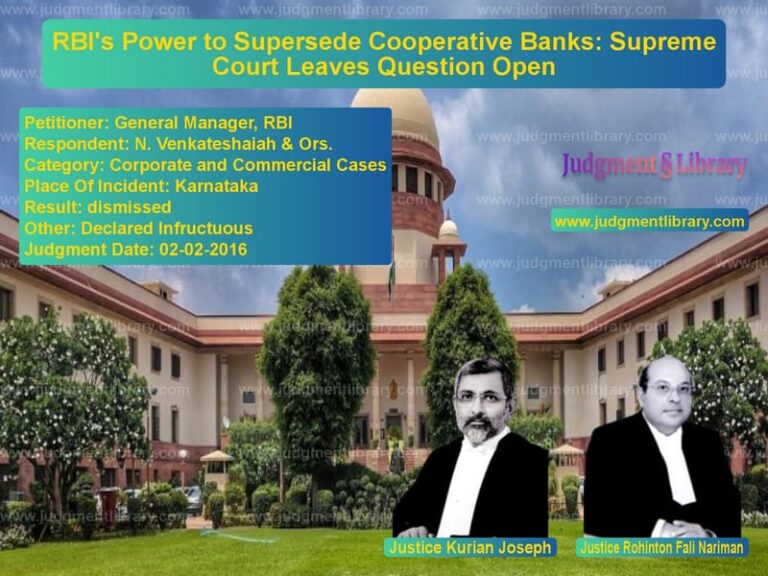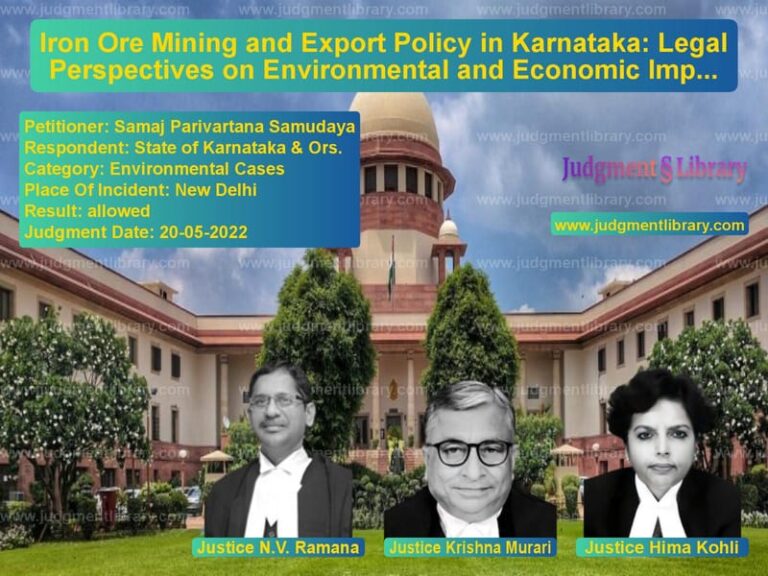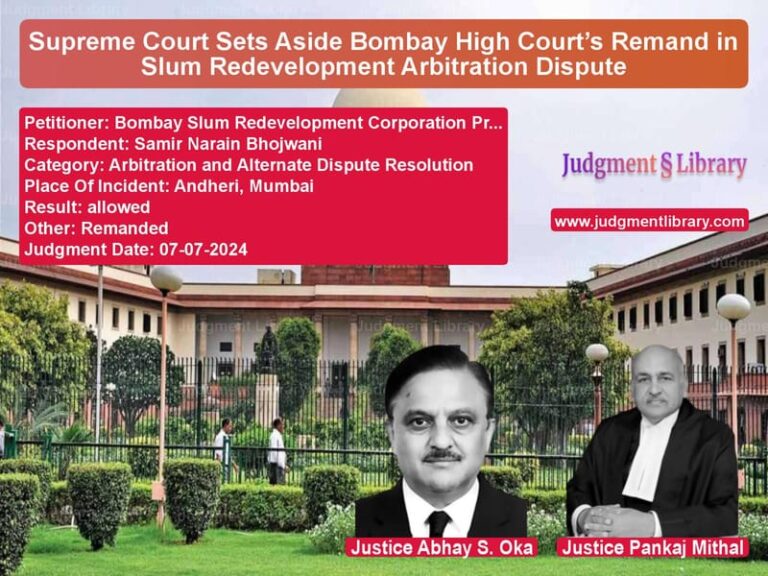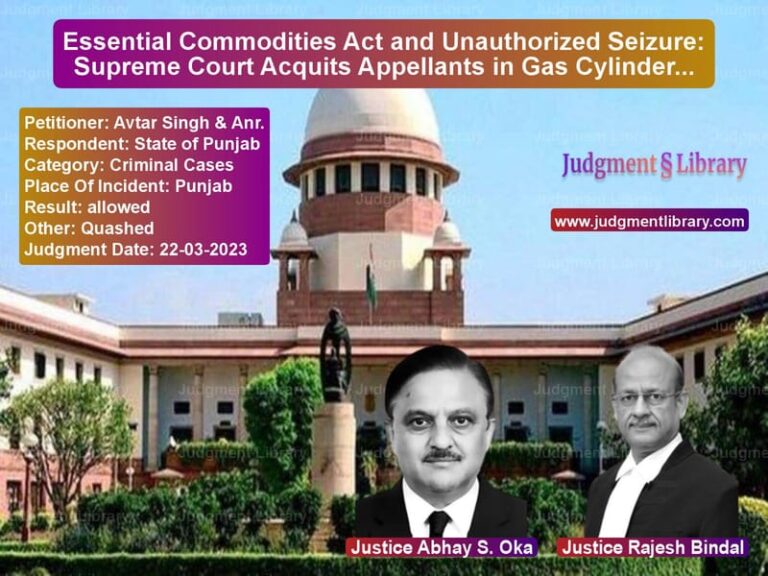Supreme Court Rejects Delay Condonation for Filing Written Statement After 4.5 Years
The case of Nitin Mahadeo Jawale & Ors. vs. Bhaskar Mahadeo Mutke revolves around the issue of condoning an extraordinary delay in filing a written statement in a civil suit. The Supreme Court of India, in its judgment dated November 22, 2024, upheld the decision of the Bombay High Court, which set aside the trial court’s order that had permitted the defendants to file their written statement after a delay of 4.5 years.
Background of the Case
The dispute originated in a civil suit filed by Bhaskar Mahadeo Mutke (respondent/plaintiff) against Nitin Mahadeo Jawale and others (petitioners/defendants). The defendants failed to file their written statement within the prescribed time, leading the trial court to close the stage for filing the written statement. However, after a delay of more than four and a half years, the defendants sought permission to file their written statement.
The trial court condoned the delay and allowed the written statement to be filed. Aggrieved by this order, the plaintiff challenged it before the Bombay High Court, which set aside the trial court’s decision. The defendants then approached the Supreme Court.
Read also: https://judgmentlibrary.com/supreme-court-upholds-specific-performance-of-1986-oral-sale-agreement/
Key Legal Issues
- Whether a delay of 4.5 years in filing a written statement can be condoned.
- Whether litigants can shift the blame onto their advocates for procedural delays.
- Whether the trial court erred in allowing the defendants to file their written statement after an inordinate delay.
Petitioner’s Arguments
The defendants argued that:
- The delay occurred due to negligence on the part of their advocate, and they should not be penalized for their lawyer’s failure.
- The trial court had exercised its discretion judiciously in allowing the late filing of the written statement.
- The High Court erred in interfering with the trial court’s decision and should have adopted a lenient approach.
Respondent’s Arguments
The plaintiff contended that:
- The defendants had more than sufficient time to file their written statement but failed to act diligently.
- Allowing such an extraordinary delay would set a dangerous precedent and encourage careless litigation practices.
- The defendants’ attempt to shift the blame onto their advocate was an unjustified excuse to circumvent procedural rules.
Supreme Court’s Observations
The Supreme Court analyzed the arguments and made the following key observations:
1. Responsibility of the Litigant
The Court emphasized that litigants must take responsibility for their cases and cannot place the entire blame on their advocates. It stated:
“The litigant owes a duty to be vigilant of his own rights and is expected to be equally vigilant about the judicial proceedings pending in the court initiated at his instance.”
2. Growing Trend of Blaming Advocates
The Court noted a concerning trend where litigants routinely blame their lawyers for delays. It warned against such practices:
“We have noticed over a period of time the growing tendency on the part of the litigants in throwing the entire blame on the head of the advocate. Not only this, we have come across cases where the concerned advocate has filed an affidavit in favor of his client(s) saying that he was unable to attend the proceedings due to some personal reasons, thereby facilitating the litigant to get the delay condoned.”
3. No Legal Justification for Excessive Delay
The Supreme Court found that the defendants had failed to provide any valid legal justification for the 4.5-year delay, stating:
“Even if we assume for a moment that the concerned lawyer was careless or negligent, this, by itself, cannot be a ground to condone long and inordinate delay.”
Final Judgment
The Supreme Court upheld the Bombay High Court’s decision and ruled:
- The trial court erred in allowing the defendants to file their written statement after an unreasonable delay.
- Litigants must be vigilant in pursuing their cases and cannot indefinitely delay proceedings.
- The petition to condone the delay was dismissed.
Impact of the Judgment
This ruling reinforces the principle that procedural discipline is essential in litigation. The decision ensures that:
- Litigants cannot escape responsibility by blaming their lawyers.
- Courts must adhere to strict timelines to prevent unnecessary delays.
- Fairness and judicial efficiency are maintained in the adjudication process.
By rejecting the petitioners’ plea, the Supreme Court has sent a strong message that litigants must act diligently and responsibly in all judicial proceedings.
Petitioner Name: Nitin Mahadeo Jawale & Ors..Respondent Name: Bhaskar Mahadeo Mutke.Judgment By: Justice J.B. Pardiwala, Justice R. Mahadevan.Place Of Incident: Aurangabad, Maharashtra.Judgment Date: 21-11-2024.
Don’t miss out on the full details! Download the complete judgment in PDF format below and gain valuable insights instantly!
Download Judgment: nitin-mahadeo-jawale-vs-bhaskar-mahadeo-mutk-supreme-court-of-india-judgment-dated-21-11-2024.pdf
Directly Download Judgment: Directly download this Judgment
See all petitions in Contract Disputes
See all petitions in Legal Malpractice
See all petitions in Damages and Compensation
See all petitions in Judgment by J.B. Pardiwala
See all petitions in Judgment by R. Mahadevan
See all petitions in dismissed
See all petitions in Quashed
See all petitions in supreme court of India judgments November 2024
See all petitions in 2024 judgments
See all posts in Civil Cases Category
See all allowed petitions in Civil Cases Category
See all Dismissed petitions in Civil Cases Category
See all partially allowed petitions in Civil Cases Category

